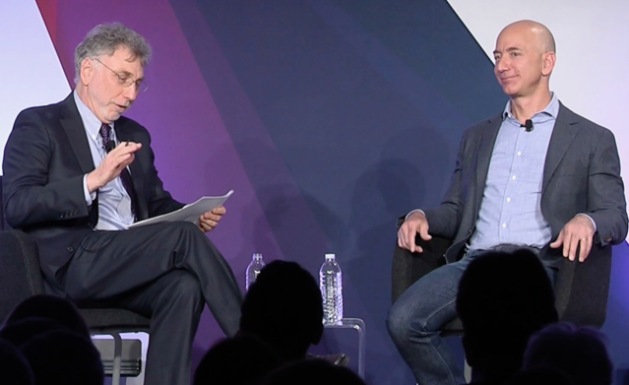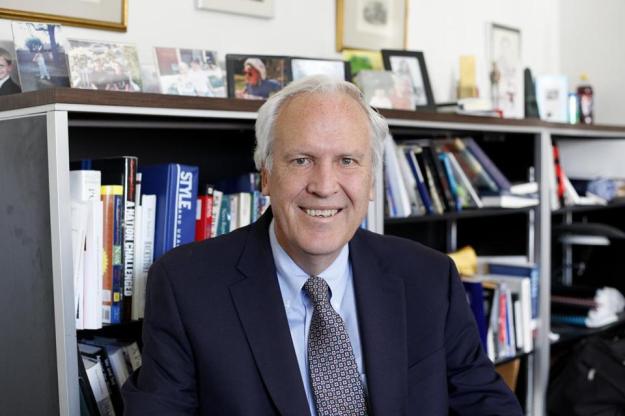
Aaron Kushner speaking in April 2013 at California State University, Fullerton.
This commentary was published earlier at The Huffington Post.
Has Orange County Register owner Aaron Kushner run into nothing more than a bit of turbulence from which he can recover? Or do the layoffs he announced last week show that his plan to resuscitate the newspaper business by hiring more journalists and doubling down on print is fundamentally flawed?
I hope it’s the former — not just because I’d like to see him prove everybody wrong (including me) about the future of news, but because I’m planning to include him in a book about a new breed of media moguls who are using their personal wealth and smarts to innovate their way toward a brighter future. (News of the layoffs was broken by Gustavo Arellano of OC Weekly, which has taken a jaundiced view of Kushner’s ownership.)
Trouble is, there have been hints previously that Kushner, 40, lacked the sheer financial firepower of Boston Globe owner John Henry or Washington Post owner Jeff Bezos. I’ll get to that in a moment. But first, a little background on what’s unfolding in Southern California.
Kushner, who bought the Register in 2012 for $50 million, was the most celebrated new newspaper owner in the country before he was eclipsed in August of last year by Bezos and Henry. “Can Aaron Kushner save the Orange County Register — and the newspaper industry?” asked the Columbia Journalism Review last May. As CJR’s Ryan Chittum explained it, Kushner’s vision was based on:
- Lavish attention to the print product, including more pages and an upgrade in the quality of paper.
- A move away from free or even reduced-price content online, with Internet users paying exactly the same fees as print subscribers.
- An increase in the size of the newsroom staff, as he added 140 journalists to the 180 who were there when he bought the paper.
Nor was Kushner content with pumping up the Orange County Register. Last August he started a new daily, the Long Beach Register. He bought The Press-Enterprise of Riverside. And in his most audacious move yet, he announced plans to start a Los Angeles Register to compete with the Los Angeles Times, once among the best newspapers in the country and still formidable. (LA is also home to a second paper, the Los Angeles Daily News.)
Then, last week, came a significant setback. Not everyone agrees on the figures, but Ken Bensinger of the LA Times reported that Kushner laid off about 35 people at the Orange County Register and 39 at The Press-Enterprise. Register editor Ken Brusic and other top editors left. Rob Curley, who had overseen digital initiatives at papers at the Washington Post and the Las Vegas Sun, was promoted to the top position.
“We are evaluating our cost structure for the next leg of our journey in terms of covering Orange County and LA County,” Kushner told New York Times media columnist David Carr, who noted that Kushner plans to plunge ahead with his idea for a Los Angeles paper without adding any staff. Carr wrote:
By amortizing the costs of all the journalists he hired over a bigger market, he can achieve savings in terms of production while adding marginal readers and advertising.
He clearly sees himself as a smart entrepreneur making bold bets. I see a man on a wire, with millions of dollars and hundreds of jobs at stake.
As for past hints that Kushner may not be well-heeled enough to play the long game, you may recall that, several years ago, he tried to buy The Boston Globe. (The Globe’s then-owner, the New York Times Co., apparently showed no interest, and Kushner later struck out on a bid to purchase Maine’s Portland Press Herald.)
Before Kushner gave up on his Globe dream, though, Katherine Ozment wrote an in-depth profile of him for Boston magazine. Among other things, Ozment attempted to show precisely how Kushner had made a fortune in the greeting-card business, his major claim to fame up to that time. What she found was a haze of acquisitions, layoffs and charges (which Kushner denied) that he was late in paying artists, sales reps and the like.
Eventually Kushner left his company after some sort of falling-out with the investors, though he told Ozment he remained part of ownership. “I had a vision for the business, and they had a very different vision, and they controlled the working capital, so we decided to move on,” he said.
Despite that possible warning sign, it has to be noted that the Orange County Register remains a much more richly staffed paper today than when Kushner bought it. In a memo to his staff published by the blog LA Observed after the layoffs were announced, Kushner wrote that he now has 370 journalists — uh, make that “content team members” — covering Orange County and Los Angeles County, up from 198 a year and a half ago.
An optimistic take would be that Kushner got ahead of himself and is now retrenching, but not retreating. No doubt we’ll know a lot more as 2014 unfolds.
Photo (cc) by CSUF Photos and published under a Creative Commons license. Some rights reserved.








